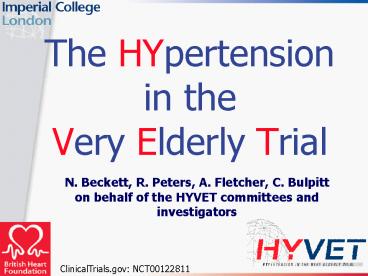The HYpertension in the Very Elderly Trial - PowerPoint PPT Presentation
1 / 21
Title:
The HYpertension in the Very Elderly Trial
Description:
on behalf of the HYVET committees and investigators. ClinicalTrials.gov: NCT00122811 ... Nigel Beckett MD University Salaries supported by ... – PowerPoint PPT presentation
Number of Views:100
Avg rating:3.0/5.0
Title: The HYpertension in the Very Elderly Trial
1
The HYpertension in the Very Elderly Trial
N. Beckett, R. Peters, A. Fletcher, C. Bulpitt
on behalf of the HYVET committees and
investigators
ClinicalTrials.gov NCT00122811
2
Disclosure Information
The Hypertension in the Very Elderly Trial main
results
Disclosure InformationThe following
relationships exist related to this presentation
Dr . Nigel Beckett MD University Salaries
supported by Dr. Ruth Peters PhD
Servier/British Heart Foundation Prof Astrid
Fletcher PhD No Support Prof Christopher
Bulpitt MD Imperial College Consultancy fees
supported by Servier
3
Blood Pressure The Very Elderly (aged 80 or
more)
- Epidemiologic population studies suggest better
survival with higher levels of blood pressure - Clinical trials recruited too few.
- Meta-analysis (n1670) (Gueyffier et al. 1997)
- 36 reduction in the risk of stroke (BENEFIT)
- 14 (p0.05) increase in total mortality (RISK)
- Hypertension in the Very Elderly Trial (HYVET)
pilot results (n1273) similar to meta-analysis
(Bulpitt et al. 2003)
4
The Trial International, multi-centre,
randomised double-blind placebo
controlled Inclusion Criteria
Exclusion Criteria Aged 80 or
more, Standing SBP lt 140mmHg Systolic BP 160
-199mmHg Stroke in last 6
months diastolic BP lt110 mmHg,
Dementia Informed consent Need daily nursing
care Primary Endpoint All strokes (fatal and
non-fatal)
Target blood pressure 150/80 mmHg
5
Statistical Analysis
- Numbers based on a 35 reduction in all strokes
- a 0.01 ß0.1
- Stroke event rate of 40/1000
- 10,500 patient-years of follow-up required
- 3 interim analyses planned
- Stopped at 2nd as decrease in stroke and
all-cause mortality - Independent Steering, Ethics and Data Monitoring
Committees - Independent Endpoints Committee (blinded
evaluation) - ITT and PP analyses
- Other main trial endpoints total mortality,
cardiovascular mortality, cardiac mortality,
stroke mortality, heart failure
6
- 3845 randomised Western Europe (86) Eastern
Europe (2144), China (1526), Australasia (19),
Tunisia (70) - At end of trial 1882 still in double blind, 17
vital status not known, 220 in open follow-up
7
Baseline data
Fall in SBP 20mmHg and/or fall in DBP
10mmHg
8
Baseline Data (Previous Cardiovascular History)
9
Baseline data (Cardiovascular Risk factors)
10
Blood pressure separation
15 mmHg
Median follow-up 1.8 years
6 mmHg
11
All stroke (30 reduction)
P0.055
12
Total Mortality (21 reduction)
P0.019
13
Fatal Stroke (39 reduction)
P0.046
14
Heart Failure (64 reduction)
Plt0.0001
15
ITT Summary
16
Per-Protocol
17
Biochemical Changes from Baseline (2 year cohort)
- In 2 year cohort there were no significant
differences between the groups with regard to
change in serum. - Potassium
- Uric acid
- Glucose
- Creatinine
- At 2 years 73.4 on combination treatment in
active group (85.2 placebo)
18
Safety
- Reported serious adverse events
- (after randomisation)
- 448 in the placebo group vs 358 in active
(p0.001) - Only 5 categorised by the local investigator
possible SADRs (3 in placebo group, 2 being in
active)
19
Conclusions
- Antihypertensive treatment based on indapamide
(SR) 1.5mg ( perindopril) reduced stroke
mortality and total mortality in a very elderly
cohort. - NNT (2 years) 94 for stroke and 40 for
mortality - Large and significant benefit in reduction of
heart failure events and for combined endpoint of
cardiovascular events - Benefits seen early
- Treatment regime employed was safe
20
Cautions
- Subjects recruited generally healthier than those
within a general population - Benefit from treating systolic pressures less
than 160mmHg requires further research - Target blood pressure was 150/80 mmHg
- Benefit from lower targets still needs to be
established
21
Acknowledgements
- Professor C. Bulpitt (Principal investigator)
Professor A.E. Fletcher (Co-investigator) - The HYVET co-ordinating office
- The members of the HYVET Committees
- Steering Committee (Dr. T. McCormack, Prof. J.
Potter, Prof. B.G. Extremera, Prof. P. Sever,
Prof. F. Forette, Assoc. Prof. D. Dumitrascu,
Prof. C. Swift, Prof. J. Tuomilehto) - End-points Committee (Dr. J. Duggan, Prof. G.
Leonetti, Dr. N. Gainsborough, Prof. MC. de
Vernejoul, Prof. J. Wang, Dr. V. Stoyanovsky) - Data-monitoring Committee (Dr. J. Staessen, Ms.
L. Thijs, Dr R. Clarke, Dr K Narkiewicz) - Ethics Committee (Prof. R. Fagard, Prof. J.
Grimley Evans, Dr. B. Williams) - Dementia Diagnosis Committee (Prof. J.
Tuomilehto, Dr R. Clarke, Dr I. Walton, Dr C.
Ritchie, Dr A. Waldman) - All the HYVET investigators
- All the HYVET national co-ordinators
- R. Warne/I. Puddey (Australia), H. Celis
(Belgium) V. Stoyanovsky (Bulgaria), L. Liu
(China), R Antikainen (Finland), F. Forette
(France), J. Duggan (Ireland), C.Anderson (New
Zealand), T. Grodzicki (Poland), A. Belhani
(Tunisia) C. Clara (Portugal), D. Dumitrascu
(Romania), Y. Nikitin (Russia), C. Rajkumar (UK) - Professor C. Nachev (Steering committee member,
National Co-ordinator of Bulgaria and HYVET
investigator from 1998 until his death in 2005) - The British Heart Foundation
- The Institut de Recherches Internationales
Servier































